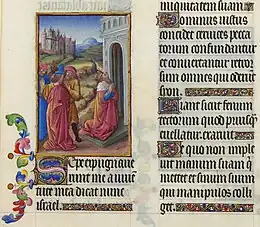| Psalm 129 | |
|---|---|
| "Many a time have they afflicted me from my youth" | |
| Song of Ascents | |
 Beginning of Psalm 129 in Les Très Riches Heures du duc de Berry, Folio 62r | |
| Other name |
|
| Language | Hebrew (original) |
| Psalm 129 | |
|---|---|
| Book | Book of Psalms |
| Hebrew Bible part | Ketuvim |
| Order in the Hebrew part | 1 |
| Category | Sifrei Emet |
| Christian Bible part | Old Testament |
| Order in the Christian part | 19 |
Psalm 129 is the 129th psalm of the Book of Psalms, beginning in English in the King James Version: "Many a time have they afflicted me from my youth". In the slightly different numbering system used in the Greek Septuagint and the Latin Vulgate, this psalm is Psalm 128.In Latin, it is known as "Saepe expugnaverunt me a iuventute".[1] It is one of 15 psalms that begin with the words "A song of ascents" (Shir Hama'alot). The New King James Version calls it "A Song of Victory over Zion’s Enemies",[2] and the Revised Standard Version calls it a "Prayer for the Downfall of Israel’s Enemies",[3] but Albert Barnes notes that the psalm itself is merely entitled "A Song of Degrees" (i.e. a Song of Ascents) and it is not attributed to any author.[4]
The psalm forms a regular part of Jewish, Catholic, Lutheran, Anglican and other Protestant liturgies.
Text
King James Version
- Many a time have they afflicted me from my youth, may Israel now say:
- Many a time have they afflicted me from my youth: yet they have not prevailed against me.
- The plowers plowed upon my back: they made long their furrows.
- The LORD is righteous: he hath cut asunder the cords of the wicked.
- Let them all be confounded and turned back that hate Zion.
- Let them be as the grass upon the housetops, which withereth afore it groweth up:
- Wherewith the mower filleth not his hand; nor he that bindeth sheaves his bosom.
- Neither do they which go by say, The blessing of the LORD be upon you: we bless you in the name of the LORD.
Origin
Barnes argues that this psalm "would be applicable to many periods of the Jewish history, and it is not of such a nature that it can with certainty be referred to any one of them. There is nothing in it which would forbid us to suppose that it was composed on the return from the Babylonian exile, but there is nothing to fix it definitely to that event ... It would seem probable that it was composed during a time of trouble, of war, or of persecution. Why it was made one of the 'Songs of Degrees' is equally unknown".[4]
Uses
Judaism
This psalm is recited following Mincha between Sukkot and Shabbat Hagadol.[5]
Catholic Church
According to ancient tradition from the Middle Ages, this psalm was sung as the last psalm of the office of vespers on Monday, by the Rule of St. Benedict (530).[6] The tract for Passion Sunday (the fifth Sunday of Lent) incorporates verses 1-4.[7]
In the Liturgy of the Hours now, Psalm 129 is sung or recited on the Thursday of the fourth week of the four weekly cycle of liturgical prayers, and in the Office of the middle of the day.[8]
Musical settings
Heinrich Schütz composed a metred paraphrase of Psalm 129 in German, "Die Feind haben mich oft gedrängt", SWV 234, for the Becker Psalter, published first in 1628.
References
- ↑ Parallel Latin/English Psalter / Psalmus 128 (129) medievalist.net
- ↑ Psalm 129: NKJV
- ↑ Psalm 129: RSV
- 1 2 Barnes, A., Barnes' Notes on Psalm 129, accessed 12 June 2022
- ↑ The Complete Artscroll Siddur, page 530
- ↑ Psautier latin-français du bréviaire monastique, (1938/2003) p. 499.
- ↑ Finelli, J., Mass Propers for the Extraordinary Form: Passion Sunday, accessed 12 June 2022
- ↑ Prosper Guéranger, Règle de saint Benoît, (Abbaye Saint-Pierre de Solesmes, réimpression 2007) p 46.
External links
- Pieces with text from Psalm 129: Scores at the International Music Score Library Project
- Psalm 129: Free scores at the Choral Public Domain Library (ChoralWiki)
- Text of Psalm 129 according to the 1928 Psalter
- Psalm 129 in Hebrew and English - Mechon-mamre
- A song of ascents. / Viciously have they attacked me from my youth text and footnotes, usccb.org United States Conference of Catholic Bishops
- Psalm 129:1 introduction and text, biblestudytools.com
- Psalm 129 – Afflicted Yet Confident in God's Deliverance enduringword.com
- Psalm 129 / Refrain: The Lord ransoms the life of his servants. Church of England
- Psalm 129 at biblegateway.com
- Charles H. Spurgeon: Psalm 129 detailed commentary, archive.spurgeon.org
- "Hymns for Psalm 128". hymnary.org.